Meet Rahim, VSO's Volunteering Leadership Project Manager who has worked for VSO for 8 years. Learn about his work promoting VSO's Volunteering for Development strategy.
What brought you to the development sector?
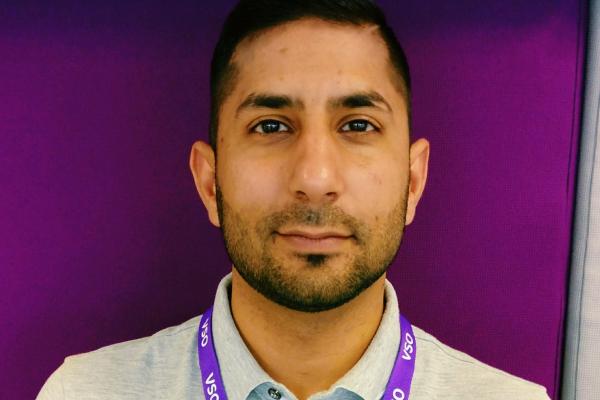
"My career in the social impact sector started 20 years ago at The Prince's Trust, where I coordinated the first overseas volunteering project to Africa in partnership with the BBC. The project involved taking young people from the UK to Kenya and Uganda for sports-based volunteering in schools and communities, and for them to experience some of the country itself. We worked alongside two-time Olympic gold medallist Kip Keino and ended each project with a fun run for 1,000 young people at the Kipkeino High School in Eldoret, Kenya.
The young volunteers were either from the care system, long-term unemployed, educational underachievers, or ex-offenders (sometimes all four). As well as experiencing safari, white water rafting and camping each night – a first for all of them – living and working with communities was a truly transformational experience for these young people. As a result, they all went on to do great things in their lives, both personally and professionally.
It was this experience that gave me a newfound interest in bringing an international dimension to my work with young people and communities."
What is your role at VSO and how has it evolved?
"My current role at VSO is to lead the development and global rollout of the world’s first Global Volunteering Standard on behalf of the International Forum for Volunteering for Development.
I first came to VSO in 2015 as the UK lead for the International Volunteering for All project (IVO4all). The project was funded by the European Commission, and I had the privilege of working with institutions and organisations across France, Lithuania, Luxembourg, Italy and the UK. The project successfully improved practice and policy across Europe to make volunteering more accessible to young people from lower socio-economic backgrounds.
Then in 2018, I was asked to explore ways to develop a set of good practice standards for the wider Volunteering for Development (VfD) sector to promote learning, improvement and knowledge-sharing across the sector.
I was determined to ensure that it would be truly global, developed by the sector, for the sector. I secured the support and expertise of 42 organisations across the world, researched over 100 existing good practice standards, and collated the thoughts of over 700 practitioners from more than 80 countries. Finally, I established and managed specialist working groups to develop the Standard itself.
We launched in 2019 and it’s had a fantastic reception from institutions and organisations across the world, including the United Nations Volunteers (UNV) and the African Union."
Tell us more about developing the Global Volunteering Standard
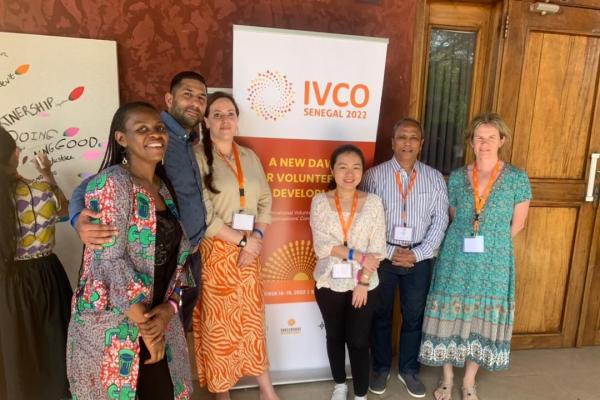
"Prior to the creation of the Global Volunteering Standard, there was no globally recognised set of good practice standards that focus on the Volunteering for Development sector. We developed it as a framework to support volunteer-involving organisations to better understand good practice and to become more responsible and more impactful in their work.
The Standard is voluntary, and volunteer-involving organisations can access it for free. It contains a collective, global understanding of good practice through the whole volunteering programme cycle: Designing and Delivering Projects, Duty of Care, Managing Volunteers and Measuring Impact.
A big focus this year has been developing the Global Volunteering Standard Platform – a free online resource for organisations to achieve the Sustainable Development Goals. It includes the Standard, an online Self-Assessment Tool and a Good Practice Library of tools and resources. I recently had the opportunity to present the platform at IVCO 2022 in Senegal, which brought together 135 leaders of VfD institutions from 35 countries."
Why do you think the Global Volunteering Standard is important for the sector?
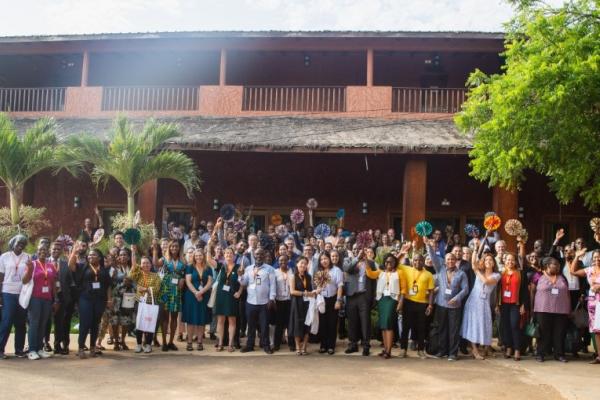
"For organisations that work with volunteers, the Global Volunteering Standard is the first step on a journey of learning and improvement. It serves as both a tool to help organisations be more responsible and impactful, and a platform for the sector to share good practice, discuss challenges and work together to develop solutions that maximise impact.
We aim for the Global Volunteering Standard, which is now available in seven languages, to continuously adapt to new global challenges. We are continually working with practitioners and subject matter experts to ensure we are constantly evolving with the latest research and the reality on the ground.
For example, climate action and environmental protection have formed central pillars for the Standard from the beginning – but we also know that it is both complex and continually changing. As such, we need to ensure that these core values are strong enough to permeate our work, but flexible enough to adapt and react to a constantly evolving crisis. The Covid-19 pandemic created a similar environment – for example, the increase in virtual volunteering opportunities during the pandemic led us to strengthen the guidance for good practice in that area in the 2021 iteration of the standards.
Another stark example would be the murder of George Floyd. It was an event that shocked the world and started an important global conversation that was long overdue. We took the opportunity to ask ourselves how we can do better, how we can practice anti-racism and work towards radical decolonisation in volunteering and the aid sector."
Where do you feel you’ve grown the most, both personally and professionally?
"Having the opportunity to work with people at all levels from across the world has given me so many insights, especially into the diversity of ethical working approaches and practices. I’ve also come to appreciate how important it is to get out of your organisational bubble from time to time – it helps us bring so much more back into our own work and organisation.
The ability to have a meaningful and respectful dialogue with others, regardless of culture, race, ethnicity, gender, class, or any other context, opens so many doors. And the best thing about an open door is that you can go through it both ways, which is vital if we want our work, our leadership, and the sector as a whole to be truly inclusive, accessible and globally relevant."
Can you describe your typical day?
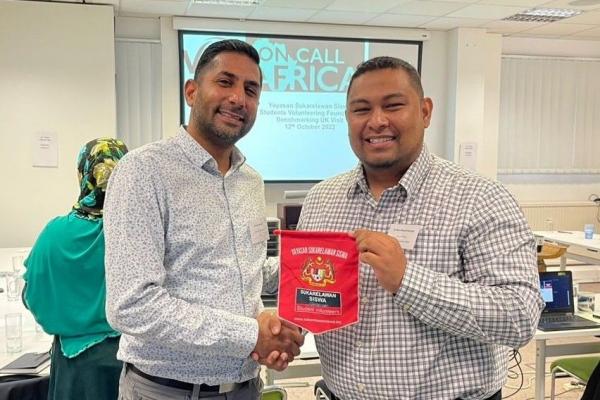
"I typically wake up in time for sunrise to meditate, practice yoga, and set an intention for the day. After that, my work is so varied that each day can be vastly different. It can involve meeting with heads of agencies, developing resources to help organisations adopt the Global Volunteering Standard, or participating in communities of practice and specialist working groups.
Alongside developing the Global Volunteering Standard Platform, the last few months have been particularly exciting. I planned a VSO event to host colleagues from the Malaysian student network, Yayasan Sukarelawan Siswa (YSS), who are working to promote a culture of volunteering among Malaysia’s 1.3 million higher education students across the ASEAN region.
I also had the opportunity to attend the World Volunteer Conference in the UAE; it was so inspiring to learn about the sheer scale of volunteering led by the Middle East that has been taking place across the world."
How do you manage the challenges of working so internationally?
I absolutely love it. It energises me because I hear different voices from around the world that I otherwise wouldn't have. It’s just a privilege to be part of such a diverse network where I’m constantly learning and growing, which is the real magic of my role.
The most challenging part is keeping up with the time zones, as we span the globe from Canada to New Zealand. Virtual meetings open up a world of possibilities, but you have to be prepared to jump in and get to work when everyone else is sound asleep – sometimes there’s not a lot of difference between a late night and a very, very early morning.
What do you enjoy the most about working at VSO?
The best thing about working at VSO is the people; my colleagues are some of the most dedicated, kind and incredibly supportive people I know.
I also love how well-known VSO is. Over the years, I’ve struck up conversations with all kinds of people in all kinds of places, and have seen their eyes light up when I mention I work for VSO, or they see my VSO t-shirt or badge; it always leads to a fascinating story.
What brings you joy outside of work?
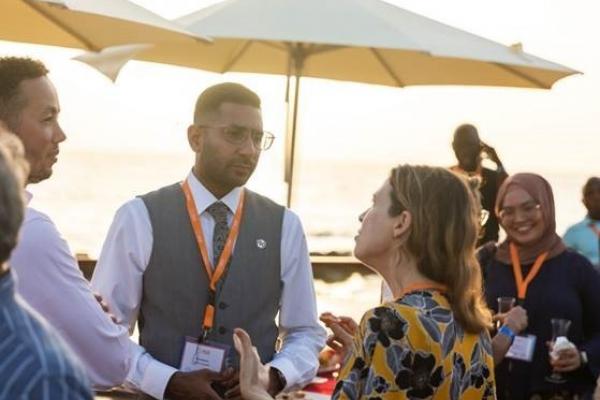
I love to volunteer myself, and I am always looking for ways to grow, both personally and professionally.
"In 2020, I helped set up the Merton Mutual Aid Group. It quickly grew into a network of 3,000 volunteers helping their neighbours during the Covid-19 lockdowns, and I was even honoured to receive the Mayor of Merton’s Covid-19 Award in 2021.
More recently, I’ve just become a non-executive director of a social enterprise called Ethical Reading, part of the Ethical Cities movement, dedicated to making our cities better places to live and work. We help local businesses and organisations develop ethical working practices in areas like community engagement, environmental sustainability, and recruitment.
I also just completed an advanced leadership course at the United Nations Staff System College. I joined a cohort of incredibly talented local sustainability champions from all over the world to exchange ideas, gain a new understanding of sustainable development, and develop skills for working across sectors.
Away from all that, I also love travelling, taking long hikes, and meeting new people. My favourite sport is squash, but I don’t currently have anyone to play with (which, it turns out, is pretty crucial). So, whether you like squash, or building multisectoral Volunteering for Development networks, please do reach out!"
Later In January 2023 Rahim will be speaking at the Volunteer Management Conference 2023 hosted by the Volunteer Management Network, endorsed by the Department of Culture, Media, Sports.
Life at VSO
Read more personal accounts of what it's like to work at VSO.
Read more
Protecting the biodiversity of the East Tonlé Sap Lake through aquaculture
Aquaculture — the farming of aquatic organisms, such as eels, shellfish, and seaweed, in a controlled environment — is transforming the lives of people like Mr Em Phat, who are living on the East Tonlé Sap Lake in Cambodia.
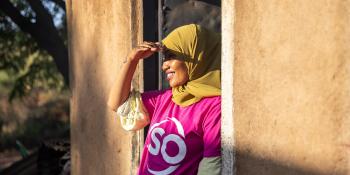
Five things women achieved this year that you might not know about
This International Women's Day, join us in celebrating the resilience of women across the globe with some female achievements you might not have heard about.
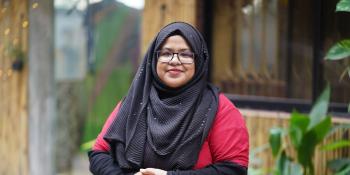
Breaking barriers: Lamia's journey of volunteering, leadership, and gender equity
Bangladesh - Lamia Tasnim's volunteering journey began in 2018, and over the course of the last six years, her passion for supporting her community has only grown.
